Free (Not) Original Storyworld Ideas, Part 7: Mine the Public Domain (Worlds of Weinbaum)
I titled this series “Free Original Storyworld Ideas” but this time out I’m going to recommend taking a serious look at story worlds that most definitely are not original. Take old public domain works and make them your own by altering them!
Like the post of GameLit I did two weeks ago, this week’s post happily coincides with a book I’ve published (“coincides” because I didn’t plan this in advance). The book is Worlds of Weinbaum, which I’ll discuss later down. But first let’s discuss the pubic domain and how to mine it for stories.
Do you realize that not only is Frankenstein and Alice in Wonderland all of Jules Verne’s works in the public domain, but a lot of early science fiction, fantasy, and horror significantly later than these works is in the public domain? For example, all of the Wizard of Oz by L. Frank Baum is in the public domain (the books, not the movie). At least some of H.P. Lovecraft’s works are also in the public domain as well as works by H.G. Wells (War of the Worlds) and Edgar Rice Burroughs (Tarzan, Barsoom/John Carter). And many others. Lots of very influential works.
How to Make a Public Domain Work Your Own–Possibilities
So wait a minute–you might be thinking–I could take the exact words of Frankenstein and make the monster into an alien instead of a mad scientist experiment, and the derivative work would be my own work as far as copyright law is concerned? With the caveat that I’m not an expert in copyright law (though I have done some research), yep, that’s what I’m saying. Take War of the Worlds and put the story in an alternate Earth in which the Confederacy won the Civil War and you can could copy the exact words of H.G. Wells if you wanted to, the exact dialog and even the same characters, but change it so the aliens are invading your Atlanta instead of London, and the resulting original work will be yours, free to copyright. Yes, that’s how it really works.
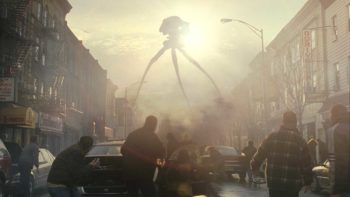
War of the Worlds movie from 2005. Hollywood LOVES mining the public domain… (Paramount Pictures)
Maybe you noticed that I mentioned above that all of L. Frank Baum’s Wizard of Oz books are now in the public domain but the movie isn’t? (And all of his are, though other authors also wrote Wizard of Oz books after him that may or may not be in the public domain.) But how could it be that the movie Wizard of Oz is not in the public domain? Well, the movie makers had legal permission to adapt the story to the screen. Their adaptation included some story changes that rendered their work an original work (plus being in a new medium). So its copyright is different than that of the Oz books. And isn’t due to expire until 2034.
As long as you followed details of Oz in accordance with the book version but not the movie version, then you would be working from a public domain work. Which means you could alter it at will and also copyright the alteration you made. So in the movie, Dorothy had ruby slippers, but in the book, they were silver slippers. So if you do Oz, as long as the slippers you write about are silver and not ruby, you aren’t violating a copyright on that particular detail. And as long as your details follow the book version of Oz, you are working from a public domain work–and you can change the details yourself and copyright the resulting changed work. Unless of course the details you alter copy the work someone else already did based on the original public domain work (so Oz you can copy, but Wicked or Oz the Great and Powerful you cannot freely copy).
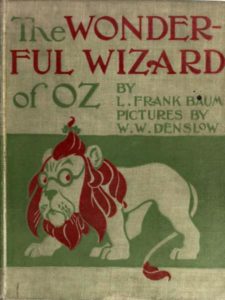
The original Wonderful Wizard of Oz cover.
So how do you proceed to get a copyright for yourself based on a public domain work?
First Step: Understand a Few Basics on Copyright Law
The most basic thing to understand is that for reasons that a bit complicated to explain in detail (follow this link for the details), in the United States there were some significant changes in copyright law during the 20th Century and so the rules are different depending on what year a work was published. As of 1 January 1978, the United States adopted a copyright law that parallels the laws most other countries have–that is, a work is assumed to be under copyright unless it is specified that it is not copyrighted. And the copyright lasts as long as the original author lives, plus 70 years.
That rule is significant to pay attention to if you want to claim the rights to a work in other countries, because a number of other countries apply this life of author plus 7o to works prior to 1978 (for example, Germany). But if you are only concerned about US copyright, the 1978 rule isn’t immediately significant for you. Even if an author died on January 2nd, 1978 (after the new law went into effect) his or her works won’t enter the public domain until 2048.
For the years 1977 and earlier, the USA required people wanting a copyright to prove they had a copyright and if they didn’t do that, their works are in the public domain. They had to register the book to establish it was copyrighted. Copyrights were for 28 years but could be extended one time. The original length of extension was another 28 years, but the US Congress changed it (eventually) to 67 years. For a maximum amount of copyright protection of 95 years. The Congress also made the change that books (and other copyrights) between 1964 and 1977 were automatically extended. Books 1963 and earlier were not automatically extended–and I’ve read one estimate that about 90 percent of books prior to 1963 did not have their copyright extended…and if not, they are in the public domain.
Second Step, Apply Four Important Copyright Rules to Determine if a Work is in the Public Domain
- The 95 year rule: This is the easiest one. Because the maximum amount of time a work can have copyright protection in the USA is 95 years, any work older than 95 years is automatically in the public domain. Because they wait until an entire year has passed in calculating this, what this means is every work as of 2020 that was published in 1924 or earlier is in the public domain. On January 1st, 2021, 1925 will enter the public domain. And in 2022, 1926; 2023, 1927, etc.
- The 1925 through 1977 filing rule: If a work was published between 1925 and 1977, according to US law, that work is only copyrighted if the publisher specifically applied for a copyright and filed the correct paperwork. So if you want to know if a work was properly copyrighted, you will be able to find it on the US Copyright office website. If it is not on that site, it was not copyrighted (but be sure to do a thorough search).
- The 1925 through 1963 renewal rule: Even if a work was in fact copyrighted prior to this time, if a work’s copyright was filed between 1925 and 1963 and the publisher or author did not renew the copyright, the copyright expired and the work is in the public domain now. The majority of these works are in the public domain because most book copyrights were not renewed. But this is rather a danger zone that requires some research to be sure.
- The death of author plus 70 year rule (for international copyright): Recall that the 95 year rule and the rest of these are United States rules–but internationally, the rules are different. So if you’d like your book taken-from-the-public-domain-and-copyrighted-with-your-changes to be legally recognized worldwide, you also need to pay attention to the date of the death of the author, in addition to the date of the publication of the work. For example, Princess of Mars was published by Edgar Rice Burroughs in 1912 and was in the public domain some time ago in the USA. But Burroughs died in 1950, plus 70 years means his works will just enter the public domain in Germany at the end of this year…which means as of right now, a copyright of a work you would perform on any of Edgar Rice Boroughs would not be legally recognized in Germany–but next year will be good to go. (As of the date of the publication of this article in 2020, all works of authors who died in 1949 and earlier are in the public domain by this rule.)
- This last numbered point isn’t one of the rules, but it can be a sort of “easy” button for determining if something is in the public domain. Project Gutenberg maintains copies of various books and stories that happen to be in the public domain. You can always search there for your public domain work, knowing the Gutenberg people did the work for you…and you can even download a free copy of the book from them.
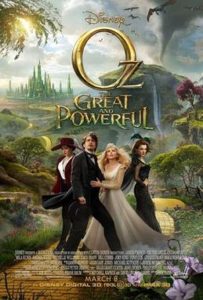
2013’s OZ The Great and Powerful movie. Do not copy anything in this movie that wasn’t in the original Oz books!
Image copyright by Disney.
Third Step, Be Aware of Already-Existing Derived Copyrighted Works and Don’t Copy Them
I already said this above, but to be extra clear, if someone else made a derived work from a public domain work, you cannot copy what they did. Oz you can use, but Oz the Great and Powerful or Wicked you can not. (By the way though–don’t these movies, Oz the Great and Powerful and Wicked, show the potential of changing a public domain work?)
Fourth Step, Create your Work and the Copyright is Yours
The question came up as I was doing some preparation for this week’s post is there’s a certain percentage you have to change a public domain work for it to be your own. Nope. There isn’t as far as I could find out. But the less you change, the easier it would be for someone to take what you did, change a few things, then say they were going off of the original public domain work, just like you did. But change a little or a lot, once you have deliberately altered a copyrighted work, the derived work is yours and you are the presumed copyright holder according to US law as it’s functioned since 1978. (Making your alterations known is a good idea from what I understand of the legalities but I don’t think is required by anyone.)
So if you like classic sci fi, fantasy, and horror tales and are eager to make them your own, some of what you really love may be in the public domain. If it is, you can make it your own copyrighted material, quite literally. Which does lead to talking about Worlds of Weinbaum.
Worlds of Weinbaum as an Example of Public Domain Mining
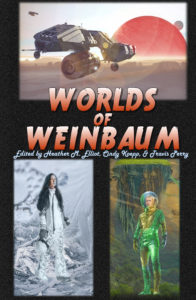
Cover art by Mary Campagna Findley. Copyright by Bear Publications.
In my podcast this week I talked to Heather Elliot and Cindy Koepp (here’s a link to the podcast of the three of us talking) about Worlds of Weinbaum (link is to the Bear Publications website for WoW), including me mentioning the reasons why we picked short stories by Stanley G. Weinbaum as the public domain “ore” we wanted to mine. Part of the reason was because I was already familiar with his stories. Weinbaum was considered one of the greatest science fiction writers of his era.
By the way, Weinbaum wrote in the early 30s and his works were copyrighted but not renewed. He also died in the 30s of lung cancer. So by both US and European standards, his works are in the public domain. (Heather Elliot simply looked them up on Project Gutenberg and found them.)
I really enjoyed the fact that Weinbaum’s stories, which were based on imagining that many planets of the Solar System could be inhabited and were teeming with alien life, including intelligent alien life, had an early-2oth Century feel to them. Like the polar expeditions of that time, privately funded, or expeditions to tropical jungle regions. Or the feel of the pioneering days of aircraft, in which bold people privately took big risks in hopes of making history. Or making a living.
Weinbaum is credited with creating the first realistic alien character, who was neither a monster nor a human-being-in-another-form. His story A Martian Odyssey is the oldest short story that’s memorialized in the Science Fiction hall of fame.
Our Changes to Weinbaum
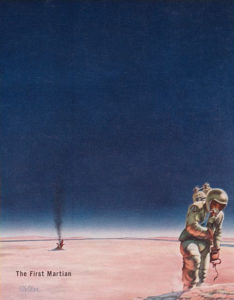
This back cover art used for Worlds of Weibaum was from a sci fi magazine from the 1950s, copyright never renewed…in the public domain…
The changes Heather, Cindy, and I made were mainly a science update to what Weinbaum imagined. The science of his day was all wrong about what the Solar System was like, but what he thought might be possible actually is more realistic for planets around another star. So that’s how we imagined the stories, being around another star.
So we imagined hypothetical aliens lifted humans who would have perished in various disasters near the end of the 1800s and early 1900s (such as the Gavelston hurricane) and lifted them to another world without making themselves directly known. These new humans reconstructed nations and cultures that in some strong ways paralleled the 1930s that Weinbaum knew…though that parallel didn’t happen until the 20th and 21st Centuries Weinbaum wrote about as his imaginary future.
In a new star system, one redder and more compact, Weinbaum’s vision of the future of private space travel and exploration shifted from impossible to “perhaps out there somewhere this could be.” We kept much of the original stories and their dialogue, but shifted things so not all the characters were European or white American, while also blunting some of the misogynist-ish and atheistic moments of the tales and mildly adding more emphasis to some of the Biblical references Weinbaum already had made.
Weinbaum’s tales are fun and energetic and wildly imaginative. They also, by the way, frequently include love interests and resourceful female characters who make major decisions–though they also get scared and seek male help at times (nope, we didn’t edit that out).
One feature of our changes is we decided the humans inhabiting these new worlds would name them for the Solar System they knew, but flip their Greek and Latin names–so Mars and Venus, which were Latin words, we changed to Ares and Aphrodite. But for Uranus, which came from Greek, we adopted Latin word “Caelus.”
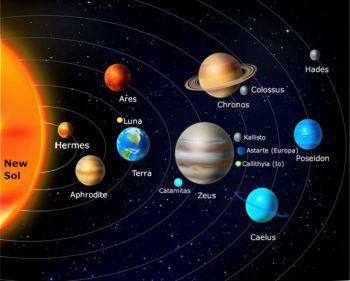
The Worlds of New Sol.
All distances of travel, references to seasons, references to past history, references to Earth animals, some character names, and some other elements we already mentioned we changed. But overall, the stories are very similar to Weinbaum’s tales as he first wrote them. With his zest and flair and fun, but more realistic and balanced. And now copyrighted, this version, by Bear Publications.
Conclusion
So if you were to mine the public domain for story ideas, what would interest you? H.P. Lovecraft? Sir Arthur Conan Doyle? Lewis Carroll? Mary Shelley? Edgar Rice Burroughs? L. Frank Baum? H.G. Wells? Someone else?
There’s a good chance that certain stories you admire might actually be in the public domain. All the authors I just named are either wholly or partially in the public domain.
So what are your thoughts on this topic?


































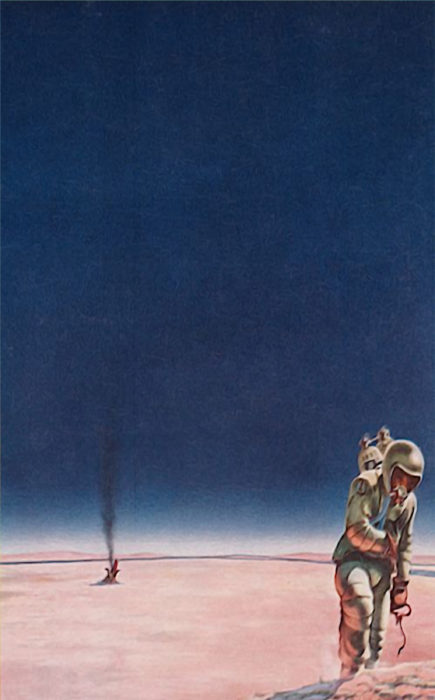









Hm…I’ve seen a ton of derivative works based on Alice In Wonderland, which I often enjoy reading. In fact, they brought my attention to the original Alice In Wonderland, which was great since, although I used to really dislike Disney’s Alice In Wonderland, I like the original tale a lot.
I do have a story world based roughly on Alice In Wonderland, but there’s an extreme amount of differences between what I’ve planned out and what Carroll originally wrote.
I’ve sort of thought about using some elements of Peter Pan, but when I looked it up there seemed to be some sticky legalities potentially caught up in its public domain status, so even if a work is ‘technically’ supposed to be in the public domain I’d recommend researching it thoroughly to ensure there’s not some odd legality in there that can cause a problem.
Mainly, if I use anything in the public domain, it’s been fairy tales and ancient legends. The Epic Of Gilgamesh has been one of my favorites, and I also like using Little Red Riding Hood and King Arthur.
I will warn people that certain legends and such have been declared off limits by cancel culture, at least for certain people, so maybe be cognizant of that and research people’s reactions to certain things when deciding what to publish. Not necessarily in the sense of avoiding everything that could possibly upset people, but in the sense of knowing what could happen and being prepared for it.
Also, I usually only stick to a few fandoms when it comes to avidly reading fanfiction(not opposed to reading fanfics outside my usual fandoms, I just don’t avidly search for them). But based on the archives on fanfiction.net and such, people write lots of fanfics for stories that are technically in the public domain, so it’s interesting to think how many of those people already wrote a story they could publish.
I’ve thought into the future too, as far as what could happen when more contemporary stories enter public domain. Like, the Naruto fanfic series I’m writing…if I had heirs, they could probably technically publish my fanfic series after Naruto itself entered the public domain. Though I suppose that could get complicated with long running manga and anime series. Considering those stories could be made over a decade or more, it could be complicated to figure out which parts are no longer in copyright and therefore safe to make derivative works of.
Kinda interesting to think about what could happen once our own original stories fall into public domain, too. If they gained any notoriety then them entering public domain would be almost like they crossed this cool threshold of basically passing on into legend. But it is a bit cringy to imagine what people would write and publish about those chars. Like, I already know plenty of weird things that would happen if someone made fanfics of my stories. Imagining people actually publishing those weird things and making money off them feels strange. Writing fanfics and derivative works, being part of a fandom, etc feels so different than being an author that is seeing(or even imagining) what their fans do/could do, lol.
Nah, I’ve totally seen people do fics for “cancelled” stories, usually by doing a “fix-it” fic. The majority of the Harry Potter fandom has collectively divorced JK Rowling for being embarrassingly colonialist and also a TERF, but they still write their HP slashfics by cherrypicking what they like from canon. I think that’s been the driving factor for teaching this current generation of teens about the concept of death of the author, lol.
I was thinking more along the lines of a few segments of woke tumblr thinking it’s basically evil or cancel worthy for people to write about Wendigos and such, at least not without staying within a very strict set of criteria. But nobody has the same perspective on any of this stuff. Even if a subset of people said that no one was ‘allowed’ to do HP fanfics because they decided Rowling needed to be cancelled, there would probably be a lot of other cancel culture people that would say that although Rowling is cancelled, that doesn’t mean fanfics are off limits.
As for the Rowling thing itself, I prefer to have a more balanced approach when it comes to authors I disagree with. I don’t have to like or agree with someone in order to respect their rights, appreciate their work, or care about them. We can and should have a dialogue about social issues and fiction without being hateful or controlling jerks about everything.
Rowling is TERF (a term I had to look up, by the way)? Well, since people born with two XX chromosomes are really in fact different from people who are born with an XY–even if they wished they were an XX–there’s some justification for being a “Trans-Exclusionary Radical Feminist”…not that I’m a radical feminist myself…
Genetics aren’t destiny, Travis.
Genetics are not destiny, but they do set some parameters. I will never be good at gymnastics and even if I had been trained from the time I was a toddler to do gymnastics I would not be Olympic-level good. My body is too large–yes, the best gymnasts are all smaller people than average.
I had potential in a few of the power lifting events, if I’d been trained from my youth, to maybe hit Olympic levels of lifting heavy objects. Possibly. Which relates to my genetics.
More obviously I will never fly under my own power, with my own wings. That’s due to my genetics, which are not those of a bird–nor will I breathe water like a fish (well, not if I want to live). Nor will I ever with the body I have, ever give birth to a child. My body is not made for that. I would have to be born female to give birth.
No “trans woman” has ever given birth, either…but some “trans men” have. Which sounds like I’m talking about objective reality and you are talking about people who are in denial of reality.
By the way, for the record, in case you decide to go to talking about racism, the objective measurements of differences among people based on (so-called) race show almost no across the board universal differences. We can’t even absolutely say that a person’s skin color will be darker if they are black than if they are white.
Race is a social construct. Gender, on the other hand, while influenced by culture, is an actual, real thing. Please reference my comments on childbirth.
I think you’re not doing enough to distinguish gender as a biological function and gender as a social construct. I prefer to refer to the biologics as “sex” and the social construct as “gender.”
About 95% of female-coded social roles have absolutely scheiss to do with biology. You can mother a child without birthing them. Heck, genetically normal parents raise DOWNS children all the time. Can they fully relate to their child the same as another DOWNS person? Probably not, but for the most part that’s not relevant. That can be outsourced.
Biological fathers? Irrelevant. Father FIGURES? Relevant. Except that steps on the toes of patriarchal authoritarians who like to think that they have a right to control their children because of bloodlines and crap like that. Abusers THRIVE on the “natural rights” that means that they can demand their children and relatives cater to them despite everything.
Genetic may give you a framework, but they do not give you a destiny.
https://www.pinterest.com/pin/705024516651235169/
This post is unexpected because it’s self-contradictory. One part mentions the difference between men and women sports being because it would be unfair to compete together. But a later remark says something about Babe Ruth being struck out by a girl (which did happen once) and some men being beaten by a women in swimming and implies the reason for female sports is because men are afraid of losing to women.
Women have played baseball against men. Some exceptional women do well–but overall, the women lose. Likewise women swimmers lose to male swimmers. Women chess players also lose to males–though this one is a puzzler, because nobody really knows why male chess players are so much better. But on average, they are…
When it comes to reproduction, biological fathers are not irrelevant. If males did not exist, there would be no reproduction. But anyway…
What you haven’t done is really ponder why all societies in the history of the world have strong divisions between genders, even though those divisions haven’t always been historically the same. Though there are certain commonalities–for example, women are always seen as more nurturing as an overall whole and men are always as an overall group more warlike. In spite of exceptional individuals, this is always true and is still true, even in societies in which modern feminism has been very influential (like Denmark–which still has more men than women in their armed forces). You need to ask yourself why that is and refuse to accept made up nonsense answers. Many gender differences derive from sex differences.
Autumn, again with the caveat that I’m not an expert on copyright law, but what I’ve read was perfectly clear on the point that everything, EVERYTHING, no exceptions, written in 1924 or earlier is in the public domain in the United States. No exceptions–Peter Pan included.
But having said that, it could be writing Peter Pan is complex because a number of things we associate with Pan were in fact produced after 1924. Certainly if you did anything that Disney did in the 1950s film, they would likely claim you were infringing their copyright. (Cause Disney is sweet like that…)
Or, a second source of complexity could be that the original copyright of Peter Pan is working off the death of the author plus seventy or a similar rule, because James Barrie was English, not American. But that’s a type of complexity I already discussed.
And Barrie died in 1937, so 2007 was the year his works became public domain in Europe as far as I know.
Yeah, there are complexities to it. I think a lot of the more relevant ones revolve around the stage play. It is interesting and worth looking into, and it should still be a reminder for people to do their research on a story before thinking they’re safe to make their own derivative works based off it. Of course, I don’t know what issues someone might face if they publish a story based off something that’s public domain in one country but not another. At the very least, it might slow down their ability to publish the story internationally.
Here’s a link for anyone that wants a starting point for things to understand and research when it comes to Peter Pan’s copyright story:
https://www.theguardian.com/business/2007/dec/28/gtormondst
Eh…this article you linked (from 2007) says that people were upset over the 70 plus year rule after author death as applied to Peter Pan (who died in 1937)…because he bequeathed profits to a hospital and people were hoping the copyright would last forever. But it did not.
Digging a little bit, yes, any stage production of Peter Pan is copyright protected in the USA until 2023. But that’s because the stage adaptation came after the book. But the book is the public domain.
The UK passed a special law saying that the Peter Pan stage production would always benefit the hospital in perpetuity, but the book version of Peter Pan–writing a book using Peter Pan–is in the public domain. Period. Worldwide.
So while there are complex cases (works in the USA between 1924 and 1963), this one is not so complex, except for the special provision the UK made for the stage production of Peter Pan that only applies there. The rest of the controversy follows the US patent law (95 years past when the stage play was copyrighted but the book was copyrighted earlier) and the international patent law, as I spelled them out.
Yes, do some research if you are going to use the methods I suggested. But copyrighted stuff 1924 and earlier IS in the public domain in the USA. No exceptions at all.
Feel free to check out th US government copyright office webpage–it says the same thing. So do many other sources.
So, fanfic is much more okay with you if the original copyright is expired? lol
Welp, that’s definitely true if you want to try to make money with your writing. I’ve pretty much given up on that idea, and it’s definitely been a much more feasible goal to write fanfic fluff to throw out on the abyssal seas of the internet. I can guarantee you more people have read that fanfic trash than have read any of my original works that languish on my hard drive until I cannibalize them for newer projects.
Tho if I hadn’t been burnt by Wattpad I could put out original fic onto the abyssal internet seas, but Archive of Our Own has a much more respectable/effective editorial structure.
Is Wicked or Oz, Great and Powerful fanfic? Um, not really. But I am fact am a fan of Weinbaum’s works and wanted to publish a collection of his short stories because they are so entertaining, even though old-fashioned and corny. Some of the storyworld I knocked off and changed, with the help of Cindy and Heather. But because I’m a science fiction guy at heart, also fixing the science from “impossible” to “well, maybe,” was important to me, too.
I guess I would not feel right about making a storyworld into my own if it’s copyrighted. I’d feel obliged to keep the conventions of the story world, even if I disagreed with them in some significant ways–which is how I feel about most things I would qualify as a fan for.
So it’s the relative freedom of the public domain that appeals to me most, I think. I doubt I’m going to get rich off of Worlds of Weinbaum, though if you go order a million copies right now, I shan’t object. 🙂
Really? i’d argue that Wicked and Oz the Disappointing is still fanfic, pretty much the same way I see Paradise Lost as fanfic.
You have an idiosyncratic definition of fanfic in my opinion. But anyway, if I wrote a Star Trek novel, something I’ve thought about doing, someone who has the copyright would either approve or disapprove the story I’d write based on what their vision of the story is. So I would not have full freedom. Which is a bit restrictinig.
Of course I can write whatever I want in a story universe without submitting it to the copyright holder. But what’s the point of that? If I’m going to enter a story world made by someone else, it’s because I want to do something different there…for other people to read.
If the only people who are ever going to read my work are totally-obsessed fans, eh, that’s not interesting to me.
I want what I write to reach ordinary people, not just the diehard fans.
And that’s why Paradise Lost probably should not be considered fanfic, not even by weirda-you. You don’t have to like the Bible to like Paradise Lost. In fact, I know several people who love Paradise Lost but are lukewarm to cold on the Bible. So it isn’t really “fanfic. Fanfic is for diehard fans of the original work…
Not really. Lots of people specifically write fanfic partly because they hate aspects(or even the entirety of) the canon work. In fact, a big motive of many fanfic writers is to ‘fix’ what they perceive as flaws. A long time ago on fanfiction.net I even read a short piece in the Bible fanfiction archive that was an atheist trashing the bible and Christianity. And supposedly a mother thought Harry Potter was bad and rewrote a ‘Christian’ version of it. So based off many patterns I’ve seen after watching several fanfic communities for over a decade, no, fanfic is not just for diehard fans.
Ok. If you say so.
But Notleia has called Paradise Lost fanfic of the Bible. I would say it isn’t. Yeah, it’s inspired by the Bible, but a lot of things that happen in Paradise Lost come from traditional interpretations of the Bible and are not really the Bible. It doesn’t even read like the Bible–for me, inspired by and fanfic are different things. Perhaps those different things are not as different as I think, but still.
As for deliberately changing things in fanfic, yeah, I’ve heard of such things before. But usually the fans are the ones who want to change things.
By the way, the Bible, since it is non-fiction overall, can’t by definition have fanfiction. Since fanfiction is for fiction. But people are awfully dumb about some things and so I suppose the Bible has fanfiction…
That’s not how I parse the word “fanfiction.” The “fiction” part refers to the product, not the source material. “Fanfic” = fiction produced by a fan.
Fanfiction is part of a body of other fiction. There is no such thing as non-fiction fanfiction. Not unless you start re-defining what fanfiction has always been as far as I know.
Since when are you an expert on fanfic? You don’t even read the stuff you’ve narrowed your definition to. I have presented my rationale for my definition, and it is a very rational rationale TYVM. I know it’s a wide definition, but I don’t think that disqualifies it in of itself.
I think it’s entirely plausible to have fanfic based on a real event. That’s a different matter entirely on whether it would be any good, but it could exist.
I’m not an expert on fanfic–but I do have some historical perspective. Such as, I never heard the term as a child, but it increasingly became used as I got older, becoming really popular after the Internet took off.
Mirriam Webster says the term was first used in 1976. But I think I first heard it circa 1990.
The new word implies fanfic is a new thing. Related to self-publishing and the Internet. Because anybody can access platforms in which stories are shared, anyone can write stories. But they write them about other stories–story franchises they are enthused about (or alternatively critical of, I guess). But fan fiction is linked to being a fan–non-fiction may have admirers, but does it have fans? Not really.
If we follow your definition of “fanfic” to its logical conclusion, into the world of non-fiction, then someone could claim that scholarly research based on previous research is actually “fanfic” of the original work. Which is ludicrous on a number of levels.
The older terms of “inspired by” or “based on” true events or non-fictional works still have meaning and should be used when appropriate.
With something like Paradise Lost, it would kind of depend. Saying someone ‘wrote a fanfic’ can be a way to make fun of or point out some of the reasons, ways and attitudes someone might have had while writing something that borrows heavily from certain ideas or works.
Drawing inspiration from something definitely doesn’t automatically turn a story into a fanfic…but several of the things you just said are still true of a lot of fanfics. Every fanfic author has their own style, so it’ll be very different from the original in that way. So it won’t ‘read like’ the original either. It’s usually very hard to make a typed fanfic ‘read like’ the show it was based on. And lot of things in fanworks have become ‘traditional interpretations’ within the fandom, rather than them actually being in the story. Naruto barely ever mentions arranged marriages, but since the setting is similar to ones where arranged marriages were a thing, a lot of fanfic writers write as if arranged marriages are fairly common political tools in the Naruto world.
But then some people write high school AU stories of those chars instead. Such AUs often use very little of the canon work except for names and some vague dynamics between the chars. It’s still fanfiction at that point…but if the fanfic writers removed anything directly associated with the canon work, polished it and indie published it, it probably would be different enough that it wouldn’t be considered fanfiction anymore, because the story would have been moved almost entirely from the fanfiction context. And the writer’s intentions for the story are now different.
Some parts of the Bible aren’t direct history, such as the parables Jesus told. But real person fiction (which I avoid) is actually a thing…which is kinda like historical fiction, except it’s basically people writing fanfics about living people so it’s a lot more…I dunno, objectifying, I guess? So people do effectively write fanfics about real things.
Not sure if that comment was meant more for me or Travis, since I’m not sure he’s ever expressed open disdain for fanfiction in terms of copyright issues? I’ll go ahead and answer your post regardless, since I’ve expressed some irritation with fanworks before. It’s nice to practice articulating my thoughts on the morals of this stuff sometimes, at least.
Fanworks in and of themselves never bothered me much, and, in fact, I think they’re a good thing. I wouldn’t spend so much time and energy working on my own fanfics if I thought fanfiction itself was bad. But a lot of times when something bothers me, it isn’t the thing itself, but the reasons, intentions, means, results, etc. If a work is within copyright, I’d mostly say that only the copyright owners should be able to sell derivative works of that material, but that is also for the benefit of the fans, not just the copyright owners. One reason I write fanfiction is to practice my writing and get feedback on it without having to worry as much about people stealing my work/ideas and publishing them. Yes, people can still technically steal my fanfics and try to claim them as their own, but they have less motive to do so since it isn’t legal for them to publish fanworks for money. Interestingly enough, people that hate being unable to sell their fanworks would probably also complain if someone(especially companies like Disney) took fanworks and sold them for money. Of course I don’t think owners of the canon work should be able to directly take and sell fanworks, but it’s interesting to see what happens when the shoe’s on the other foot. I’m still sorting out all my opinions on matters like this, though.
So far I think ‘Lifetime plus 70 years’ is a pretty reasonable expectation for copyright duration. Maybe for more modern works it might be slightly more reasonable for copyright to last indefinitely IF the author has an heir to pass the copyright along to, but at this point…I don’t know how I feel about that. It’s kinda weird to imagine Mickey Mouse entering public domain because he’s very current and a unique and an integral part of a still living company. But then it’s also understood among a lot of authors that copyright is more to protect and give incentive to the author’s creativity. And that’s important because it’s harder to want to discuss one’s original works if they can be stolen at any time. But that protection isn’t as relevant ages after someone’s death. I don’t think copyright should expire upon death for a variety of reasons, but seventy years after someone’s death seems reasonable. That’s long enough to reduce risk to the author, and allow their legacy to be remembered a little better before their stories pass on into legend and people start to ignore who originated the particular chars in question.
A lot of my complaints with fanworks center around how people treat authors. Like it or not, the story belongs to the person that wrote it. It isn’t for fans to say that authors NEED to write a certain way. Often enough authors actually have legitimate reasons for writing chars and situations the way they do. Even if they didn’t…it’s their choice at the end of the day. Writing is supposed to be fun. Even if someone is trying to make a living off their writing and should take fan input under advisement, they are not obligated to cater to everyone’s opinions. In fact, that’s impossible, considering that those opinions are not consistent in the first place. If authors want to change something in their story, that’s also their right. Sometimes that’s actually a very good thing, like Kay Fedewa’s decision to reboot The BlackBlood Alliance.
Authors are also fully fledged human beings with reasons, intentions, beliefs, etc. of their own. As obvious as that sounds, some of the more entitled fans almost act like that isn’t true. There’s nothing wrong with authors explaining the meaning, intentions, and moral of their stories. The right to do so is very important, in fact, since it’s very easy for fans to misinterpret things and make what basically amounts to false accusations toward the author. (If an author has a bad thing happen in a story, that doesn’t mean the author is ok with that bad thing happening in real life, for example). And fans should be willing to acknowledge the authors intentions, etc. That doesn’t keep fans from using critical thinking and having interesting dialogue about stories. In fact, when it comes to more mysterious authors, it can be fun to debate what the author’s original intentions MIGHT have been. Furthermore, what’s wrong with fans acknowledging the author’s original intent while ALSO taking a personal lesson from a story? ‘I know the author wrote this story to promote world peace, but I think some parts of it can be great examples of why independence and personal growth are important, so the story will also always be important to me for that reason. Because of that I will write fanfics that play up that aspect of the story.’
To an extent authors should definitely let readers be, to have their discussions and make their (non commercial) fanworks, but fans should also avoid acting like spoiled children. If they get to have opinions, so does the author. And nothing negates the fact that authors are human beings that should be able to defend themselves or clarify the intent they had for their stories, especially when someone accuses them of wrongdoing. They are not obligated to be anyone’s mouthpieces. They have the right to defend their copyrights(though they should be fair about it). They are not obligated to roll over and say that fans have just as much ownership in the story simply because the fans say they love the franchise.
It doesn’t matter if fans like an author, think the author is a horrible person, or is putting out poor quality work. Such opinions are so arbitrary (in that they vary from person to person and may not be based on actual facts) that it usually isn’t any real excuse to decide that someone suddenly loses ownership or say in a story they wrote. Even if being a bad person or someone that puts out low quality work means that someone loses some of their rights…where should that line be drawn? Who gets to decide? The ‘Lifetime plus 70 years’ things is something that pretty much every author agrees to upon publication, at least. And when it comes to the quality of the canon work, there are ways to handle that that are more respectful.
Instead of just completely trashing the author and their work, it could be more beneficial to acknowledge one’s disappointment in the canon, but then do a calm, reasonable analysis of the canon work’s flaws. Not to sneer at the author, but so the fanfiction writer can develop better writing skills and help others do the same. To an extent I’ve done that with Boruto, since it’s been very disappointing compared to Naruto and Naruto Shippuden. I haven’t finished and uploaded the fanfic that uses some of the concepts I figured out that would help fix some of the issues Boruto has, but it’s something I’d like to do eventually. But, again, it’s all about learning, not disregarding the authors. And, it does kinda annoy me when I see fans that claim to write the chars better than the authors or write the chars completely in line with the canon versions when that’s obviously not true. For that reason I try to avoid acting like my assessments of a story or my versions of other’s chars are perfect. My ideas for fixing Boruto are just that, ideas. The author could easily fix that story using other methods. And although I try to stay true to some core aspects of canon chars, I at least acknowledge that it’s rare, if not impossible, for anyone to write fanfics completely consistent with canon. Like, according to the strain of personality type stuff I subscribe to, Itachi and Sasuke would both be considered ISFJs, but I write Itachi more like an INTJ. The AU my fanfic takes place in probably makes a lot more sense if I write him as an INTJ, in fact.
Maybe being aware of an author’s opinions and rights can dampen a few fans’ enjoyment of a story, but there’s a million and one things that fans do that can greatly dampen an author’s enjoyment of EXISTING, much less their writing. So it’s like…yes, fans should have fun writing fanfiction. And that fanfiction doesn’t need to be in line with canon(it’s literally impossible to always make fanfic directly in line with canon anyway). And no, we don’t have to agree with authors or like them, but it’s ridiculous when people make a world full of demands toward the author but are perfectly happy to trample all over authors just because they feel like it.
Nah, the “you” was directed at Travis, I remember that you like fanfic.
I actually think that 70 years after the author death is excessive. Maybe 20 years, but I don’t think heirs deserve much consideration. It’s not like they did the work on anything, and it also does not actually guarantee much about preserving authorial intent if all they’re after is money (glances at the Disney company).
Then again, I don’t think authorial intent means that much, either.
You can’t necessarily know how much work the heirs did. But at the very least a lot of heirs had some sort of influence over the story, whether it was giving feedback, being an inspiration to the author, etc. Some ‘heirs’ even continue the work of their parents or whatever, and of course it doesn’t guarantee a preservation of the author’s intent, but it can help and give the author a chance to designate someone as the person to take care of that story world for the next 70 years if they so choose.
If none of that can count as doing the work and therefore deserving the benefit of the author’s copyrights, what makes The Public more deserving? In most cases The Public ‘didn’t do the work on anything’ in terms of the story, or at least not more than anyone the author would willingly pass their rights to. Sometimes, if anything, The Public can actually make things harder for an author. Maybe you can say that they supported the author with word of mouth and encouragement, but they would be the source of just as much discouragement. In either case, they aren’t doing more than a potential heir probably would. If we want to say The Public deserves the rights because it bought the author’s books or payed taxes…that’s not exactly valid either. So many people disrespect the author’s copyrights and have no problem with pirating…and, well, the author pays taxes too. That doesn’t make them entitled to someone else’s inheritance.
I know it’s easy to look at Disney, get angry at the big bad corporations and decide that heirs should get little consideration because of that, but this isn’t actually about Disney itself, especially with indies on the rise. This impacts a lot of small creators that want to leave a legacy and make life better for their descendants…so one reason why they might work so hard is to leave something of value to their descendants or even a social cause they believe in(people could designate a nonprofit organization as their ‘heir’).
I get a lot of the reasons why someone might hate the idea of people being able to inherit much, but if someone close to the author shouldn’t have much importance/regard in inheriting a story, regardless of the author’s wishes or the role they might have had in making a story…why should anyone else?
I can see that for designated heirs, but for your average biological relation who probably didn’t contribute much beyond squat, I find it harder to justify.
Anyone who profits off a public domain work is still obligated to pay taxes on it, probably more so than someone inheriting anything, what with current tax law. But I’m also in favor of increasing inheritance taxes (nonprofits already get tax breaks), so it’s a bit of “six” vs “half-dozen” to some extent, but I prefer the mechanics for creative freedom over the mechanics for creative control. The regular heirs would still gain whatever profit the author made before their death.
Notleia, what happened on Wattpad, if you don’t mind me asking?
Oh, nothing terribly story worthy, just that I got tired of wading through piles of not-even-that-entertaining trash without any hope of finding good stuff that hadn’t already been yoinked out for publishing and only left maybe 2 chapters of teaser material.
Plus I remember their search bar being simplistic and inefficient. AO3 took a bit of a learning curve, but you can get really specific with what you’re looking for.
Ah, I see. 🙂
I have a hard time understanding the way derivative works are understood and handled. How is it more okay (talking morally, lot legally) to change only 2% of an author’s words in a given story (using Mary Shelley’s Frankenstein as example) and sell that as your own work with your name on it, than it is to just take characters and background (say, Harry, Ron, and Hermione in a wizard-populated England after Voldemort dies) but then totally write ALL your own sentences and your own completely original story, ending up with something that is 95% your own work? I get that this is how the law is written, but WHY is the law that way? Why is it okay to literally just copy some (probably dead) author’s work nearly word-for-word, but it’s not okay to write an entire original story using only a very small number of scattered words ( a few character names, “Hogwarts”, “alohamora”, etc) ?
It seems to me that dates of publication or death should not be the critical yardstick as much as how much of the author’s written words did one “steal” and pass off as one’s own? If authors are allowed to write original Star Trek novels (essentially fanfiction) and sell it with their name on it and not Gene Roddenberry’s, why can’t I write and sell SeaQuest novels? Unlike Trek, SeaQuest was essentially abandoned. No one is making more TV or movies in that world and hasn’t for decades. If I acknowledge that I didn’t create the world (Timothy Zahn never claims to be George Lucas when he puts out Thrawn books) and give the creator credit, why isn’t that enough? I just don’t understand the logic of it.
The logic is essentially that while an author is alive and immediate heirs are alive, he or she should get the money from his or her own work and in addition anything obviously derived from that work could be in competition with it–so having 95% different during that time period isn’t OK, either.
But after an author is long dead and gone, the works he or she made should be for the benefit of everyone. If someone wants to put a fresh coat of paint on a public domain work and give it a new chance at life, why not? Who is it hurting? The original author is long-dead.
That’s what I believe they were thinking.
But to wait for the original copyright holder to be dead means *I* will probably be dead as well. And by that time, it’s very likely the avid fans it did have will be gone and the work will be so obscure as to be practically useless. I just wish fanfic authors could get the same deal as Marvel does: if Sony doesn’t make movies, the contract is void. If the rights’ holder abandons the franchise and/or publicly calls the franchise a fiasco, then it should be put on an “up for grabs” status after a decade or two. It shouldn’t have to wait for someone to die or 70 years to pass.
But that’s just my opinion. Opinions don’t matter when it comes to laws. And I understand you didn’t have anything to do with writing the law, Travis. I’m just frustrated and washed up.
Sorry, Caprice. I know you wrote some fanfiction you tried to sell but couldn’t. In your case, when it was for a series that was cancelled, you’d think the law would be different…
I see how that can be frustrating, but bear in mind that there’s a lot of circumstances at play and instances where policy ideas like yours could cause issues for average people(not just the big companies that annoy us). Many people, for instance, roleplay online during their teens. A lot of their chars can be very personal and meaningful to them, but life happens. Sometimes they think they won’t ever write or rp those chars again, so the story world gathers dust for the next decade or two. But then, eventually, they decide to take up writing again and have a burst of inspiration for how to reapproach their chars. Would it have been fair for them to lose copyrights just because they basically put their writing on hiatus for a couple decades? Such a risk means that many won’t feel free to write and roleplay online because they don’t want their work stolen the moment it’s ‘technically’ out of copyright. People already get their art/writing stolen often enough online, but at least for now they have the legal means to defend their work if it actually was stolen. A lot of young people learn to write/draw well by rping their characters online, and your idea would discourage that on top of all the other deterrents they have. That’s kind of a bad thing when rping can actually be a great tool for learning interpersonal skills.
Some people do love their stories and don’t ever entirely give up on them, but have to put their writing aside for a long time due to familial obligations and such. People shouldn’t lose something they own(especially if they made it) just because they set it aside for a while. That principle applies to nearly everything else. If you made an expensive car as a showpiece and said you weren’t ever going to drive it, I wouldn’t be able to walk in and take it just because I liked the car and knew you haven’t driven it for a couple decades. Heck, I wouldn’t even be able to drive it without your permission. Maybe you wouldn’t care if I drove it, but that would be your choice, not something that all car owners should have to allow when it comes to their own vehicles.
The policy you’re talking about could also inspire behavior that annoys fans greatly. If an author knows there will only be three books in a series, and the only way to keep his copyright is to publish something in that franchise once every ten years, then he might have to space out the release dates of each book. So fans of that series might have to wait a lot longer than they would have otherwise. And then, by using this principle, a company could potentially keep a copyright for like five centuries or something. All they’d have to do is publish a cruddy short film or something in that franchise every decade or so. So authors and companies would feel forced to publish low quality work more often just to keep their copyright. And one reason authors used to be so against fanfiction in the first place is because they didn’t want other people to make money off their chars, so the push to make money off fanfiction without author consent only proves them right.
Also, countless stories have seemed ‘obscure’, only to come back into prevalence centuries or even millennia later (like The Epic of Gilgamesh), so that’s not what we should worry about so much. Even without the ability to monetize fanfic, it can be useful in other ways. I would, for example, be willing to show some of my fanfics as writing samples or a way to get feedback. But I don’t sit there tapping my foot, waiting impatiently for another author’s work to go into public domain just so I can make money off it. That would be a little opportunistic, considering the fact that a fanfic writer could have just taken the idea they had, edited it to make it original, and then published it.
Thanks, Travis! Really helpful information!
I’ve planned a lot of stories like this without thinking too deeply about copyright. I think I just saw other writers doing it and didn’t hesitate to do the same. So many authors randomly write about Sherlock Holmes, Dracula, Robin Hood, etc. that I assumed it was fine, though not fine to write stories about Star Trek, James Bond, or Batman.
I’ve loved the idea of twisting known stories and/or history ever since the film Time After Time came out, claiming that H.G. Wells actually created his own time machine and had to pursue Jack the Ripper into our modern time. Still the most brilliant merging of history and fiction I’ve seen, and as such, it instantly captivated me: knowing the idea wasn’t real but adding the fun of historical facts that made it feel like it actually happened.
The most obvious and abundant use of this process is with fairy tales, that are numerous and provide excellent fantasy story fodder. I hope to continue writing several fairy tale retellings, along with continuing stories of characters from classic literature (while watching for the copyright cutoff point!).
It would be really interesting to see someone start writing new stories of characters like Tarzan, or others that some of us didn’t know were in the public domain.
There are some really interesting tales in the public domain–so I wish you the very best of luck and thanks for the positive comment.